1. Overview of
Faculty of Geology
Established
in 1966, the Faculty of Geology (FoG) is among the most highly reputable
undergraduate and graduate training programs in Vietnam. The FoG has deployed
the theoretical and applied researches to discovery and management of natural
resources; technical solutions; geoenvironment; geophysics to minimize the
impacts of natural disasters; supporting infrastructure construction; utilizing
and managing natural resources; protecting the environment; climate change; and
promoting sustainable development. These fields are receiving special attention
and investment, not only in Vietnam but in other developed countries as well.
Compared with its early days with only two departments and a few dozens of staff
members, the FoG is currently composed of 06 departments with a total of 33
staff members, including 27 teaching staff (01 Professor, 10 Associate
Professors, 17 Doctor and 01 at MSc level) and 04 researchers, technicians, and
administrative staff. The FoG has constituted significant achievement in
education for years. During 55 years of education, a great number of graduates
have held key positions at different institutions. Many others have become
leading professors and scientists.
The FoG has established effective cooperation
with many universities and research institutes at home and abroad (from United
States of America, United Kingdom, France, Germany, Denmark, Taiwan, China,
Thailand, Japan, Poland, etc.), all in a spirit of domestic and international
integration of teaching and research.
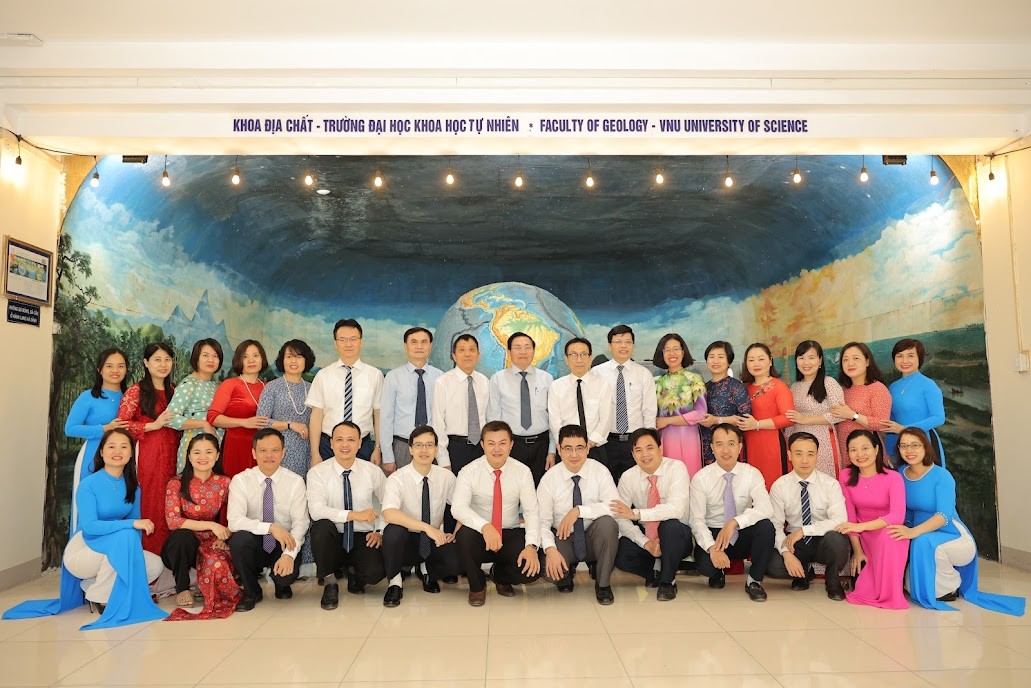
Staff
of Faculty of Geology
Contact:
Dean: Assoc. Prof. Dr. Dinh Xuan Thanh
Tel:
+ 84 4 38585097
Fax:
+84 4 38583061
Website:
http://geology.hus.vnu.edu.vn/
2. Missions and vision
Missions
Our missions are to provide training programs
in Earth Sciences at different levels to reach international standards and meet
the needs of the country and international integration; and to carry out
research, development, and knowledge transfer in the fields of Earth Sciences
for the building, development and protection of the country.
Vision
We are driving ourselves to
become a prestige training and research institution in Earth Sciences,
especially, Geology, Geoenvironment, Geotechnics and Management of Natural
Resources and Environment in the region and the world.
Educational philosophy
The educational philosophy of Faculty of Geology (FoG)
is to ensure that all students have knowledge and skills in performing the
works related in Geology, Geoenvironment, Geotechnics, and Management of
Natural Resources and Environment to reach international standards, satisfy the
needs of stakeholders and to actively contribute to the socio-economic
development of Vietnam.
The pillars of the
educational philosophy are “active learning and learning by doing”, “advanced
quality” and “social responsibility”.
- “Active learning
and learning by doing”: Students are actively involved in the
learning and acquiring knowledge to develop critical thinking, self-study and
problem-solving skills. The learning processes are combined by theoretical and
practical studies. Students can apply the fundamental and specialized knowledge
and skills to resolve the practical needs in both laboratory and the real
world.
- “Advanced
quality”: Faculty of Geology strives to provide training programs
in Geology, Geoenvironment, Geotechnics and Management of Natural Resources and
Environment at different levels to reach international standard.
- “Social
responsibility”: Training programs all serve the sustainable
development and protection of the country.
3. Organization
structure
The FoG’s Dean Board:
Dean of
the FoG: Assoc.Prof.Dr. Dinh Xuan Thanh (oversees all affairs and in charge of
post-graduate training programs); Vice Deans: Assoc.Prof. Dr. Nguyen Tai Tue (in
charge of research, science and technology) and Dr. Nguyen Van Huong (in charge
of undergraduate training programs).
Departments:
The FoG has 06 departments, consisting of Department
of Resources Management and Development, Department of Geological Science and
Technology, Department of Sedimentology and Marine Geology, Department of
Geotechnics and Infrastructure Development, Department of Geoenvironment,
Department of Petroleum Geology.
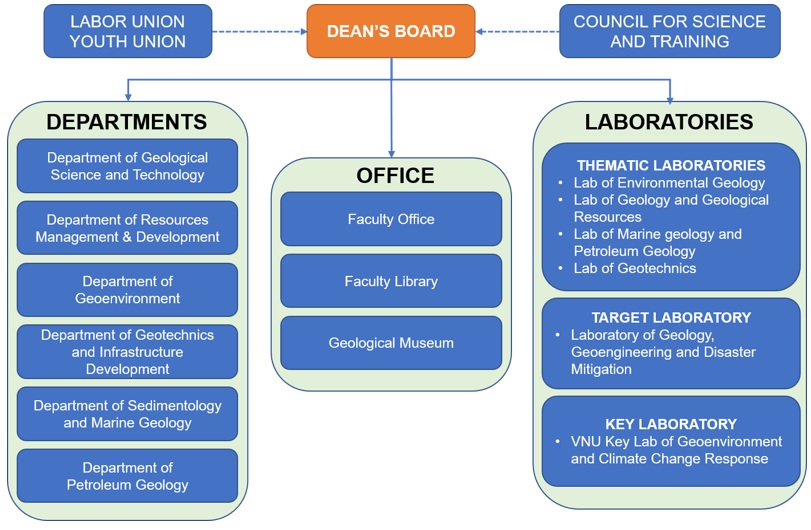
Organization structure of the FoG
Laboratories:
The
FoG also houses some modern laboratories for training and research activities,
including Thematic labs (Lab of Environmental Geology, Lab of Geology and
Geological Resources, Lab of Marine Geology and Petroleum Geology, Lab of
Geotechnics), target lab (Lab of Geology, Geoengineering and Disaster
Mitigation), Key lab (VNU Key Lab of Geoenvironment and Climate change
Response).
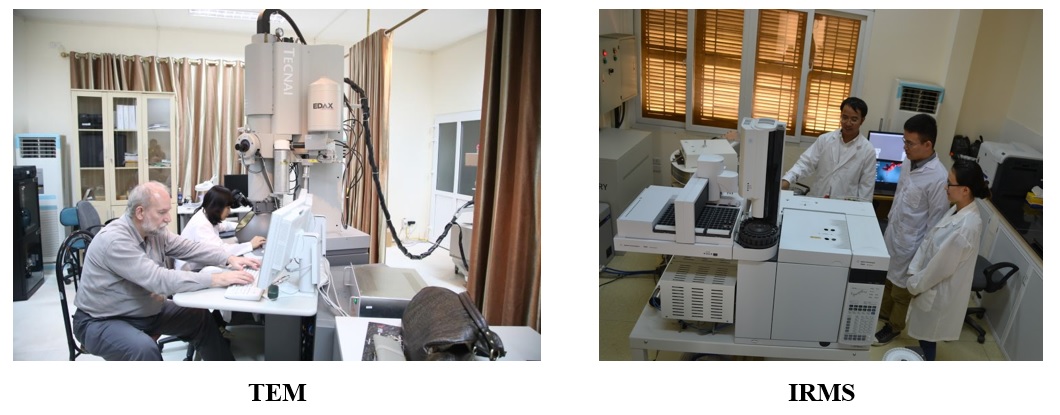
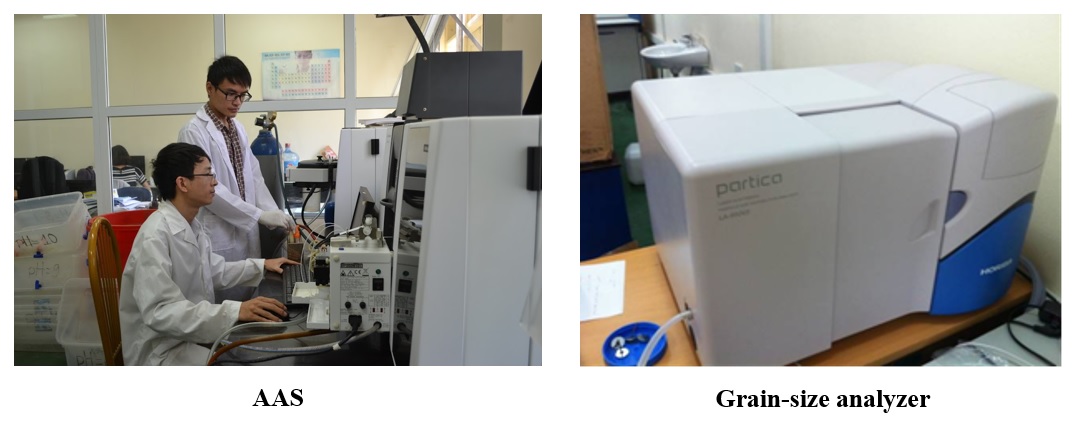
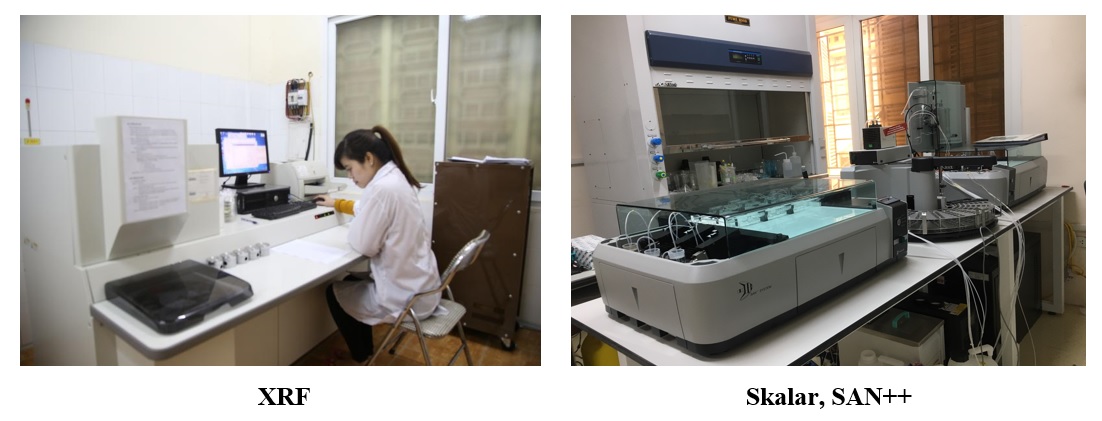
Modern facilities and equipment for research and education
4. Education programs
The
FoG takes responsible for training of three undergraduate training programs (Geology,
Management of Natural resources and Environment and Technology for Natural
Resources and Environment Monitoring) and three graduate programs (Geology,
Geoenviroment and Mineralogy and Geochemistry
5. The main scientific research fields
Resource
Geology (Mineralogy, Mineral’s science, Gemology, Petroleum), Management of Water and Land resources,
Management of Geological resources, Management of Marine Resources and Environment, Regional Geology (Stratigraphy, Petrology, Structural Geology, Paleontology,
Paleoecology), Environmental
Geology, Geotechnics and Infrastructure Development, Geotechnics and Hazard
Mitigation, Climate Change, etc.
6. Achievements
The scientific research achievements of the FoG
are remarkable. The staff of the FoG has been the main investigators of average
10 projects per year since 2008. Every year, the staff of the FoG have
published an average of 40 articles in international and national scientific
journals, and 20 scientific reports presented at international and national
conferences. Annually, the FoG participates in 1-3 internationally
collaborative projects, as well as students involved in exchange programs. The
FoG has been awarded the third Labor Medal in 2008 by State President.